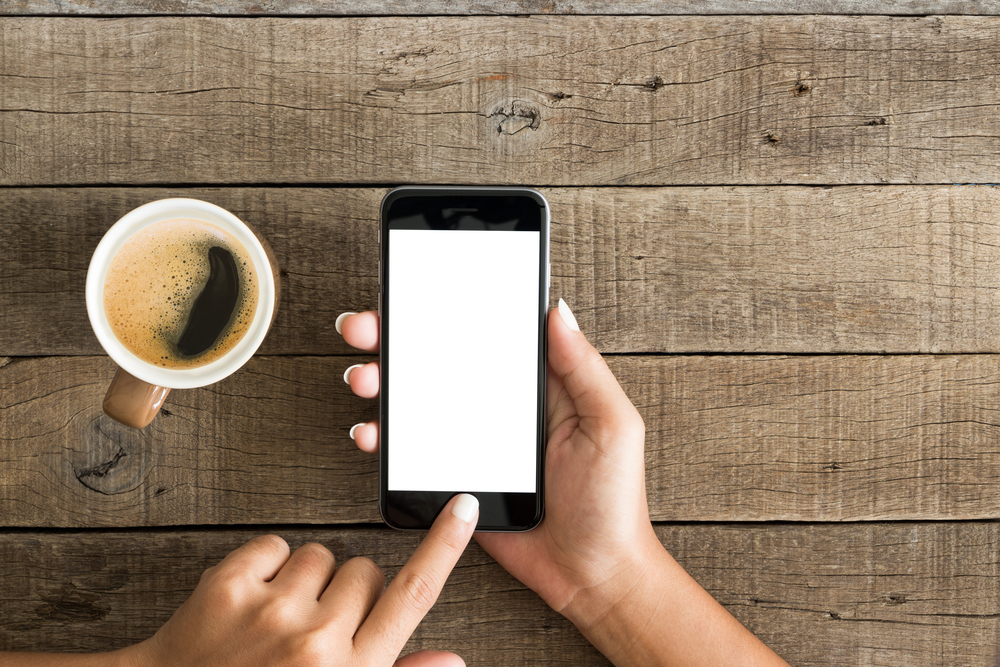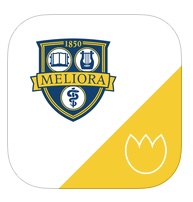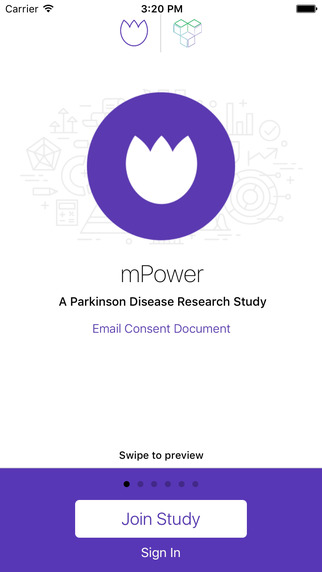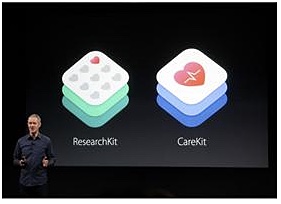Parkinson’s mPower App Celebrates Milestone – 12,000 Registered Users – and Upgrade at Apple Product Launch
Written by |

mPower, a Parkinson’s disease (PD) iPhone app developed by Sage Bionetworks and a team of neurologists at the University of Rochester Medical Center (URMC), marked the first year of its release by being highlighted in Apple Inc.’s “Loop You In” special product launch event on March 21, 2016.
 Coinciding with the event, Sage Bionetworks, a Seattle-based nonprofit biomedical research organization, released an updated version of its mPower (Mobile Parkinson’s Observatory for Worldwide, Evidence-based Research) app with an improved user interface and enhanced functionality based on user feedback. Sage also announced that mPower will be the first app incorporated into a new Apple platform called CareKit, making the mPower app an even more valuable tool in keeping Parkinson’s patients better informed about their symptoms and care status, and as a data collecting medium for clinical studies should the user wish to participate.
Coinciding with the event, Sage Bionetworks, a Seattle-based nonprofit biomedical research organization, released an updated version of its mPower (Mobile Parkinson’s Observatory for Worldwide, Evidence-based Research) app with an improved user interface and enhanced functionality based on user feedback. Sage also announced that mPower will be the first app incorporated into a new Apple platform called CareKit, making the mPower app an even more valuable tool in keeping Parkinson’s patients better informed about their symptoms and care status, and as a data collecting medium for clinical studies should the user wish to participate.
 The mPower app was created by Sage in collaboration with URMC neurologists Ray Dorsey, MD, MBA, professor of Neurology and director of the URMC Center for Human Experimental Therapeutics (CHET);
The mPower app was created by Sage in collaboration with URMC neurologists Ray Dorsey, MD, MBA, professor of Neurology and director of the URMC Center for Human Experimental Therapeutics (CHET);  Karl Kieburtz, MD, MPH, the Robert J. Joynt Professor in Neurology, senior associate dean for Clinical Research, director of the URMC National Center for Clinical & Translational Science Institute, a professor of Public Health Sciences and of Environmental Medicine, and the founding director CHET; andMax Little, PhD , an assistant professor of Mathematics and lecturer at Aston University in
Karl Kieburtz, MD, MPH, the Robert J. Joynt Professor in Neurology, senior associate dean for Clinical Research, director of the URMC National Center for Clinical & Translational Science Institute, a professor of Public Health Sciences and of Environmental Medicine, and the founding director CHET; andMax Little, PhD , an assistant professor of Mathematics and lecturer at Aston University in  Birmingham, U.K. The mPower app update development project also received financial support from the Robert Wood Johnson Foundation.
Birmingham, U.K. The mPower app update development project also received financial support from the Robert Wood Johnson Foundation.
The original Parkinson mPower app, one of Sage Bionetworks’ signature apps, launched with Apple’s then latest-generation Open Source ResearchKit in March 2015. At this year’s “Loop You In” event, Apple announced advancements to the ResearchKit framework, bringing genetic data and medical tests that have typically been conducted only in exam rooms to iPhone apps. Medical researchers are able to employ these new features as they design targeted studies for diseases and conditions that affect billions of people, and to gather more specific data from study participants.
“The response to ResearchKit has been fantastic. Virtually overnight, many ResearchKit studies became the largest in history and researchers are gaining insights and making discoveries that weren’t possible before,” Jeff Williams, Apple’s chief operating officer, said in a release. “Medical researchers around the world continue to use iPhone to transform what we know about complex diseases, and with continued support from the open source community, the opportunities for iPhone in medical research are endless.”
ResearchKit transforms the iPhone into a powerful medical research tool that can help doctors, scientists, and other researchers gather data more efficiently, frequently and accurately from participants anywhere in the world using apps like mPower. Participants enrolled in app-based studies can access an interactive informed consent process, easily complete active tasks, submit survey responses, and specify how their health data will be shared with researchers, rendering patient participation in medical research easier than ever.
Apple notes in a release: “By delivering ResearchKit as open source, any developer can quickly design a research study for iPhone. They can also build on the available software code and contribute their tasks back to the community to help other researchers do more with the framework. Using a new module just released to the open source community, researchers are now able to incorporate genetic data into their studies in a seamless, simple and low cost way. Designed by 23andMe, the module allows study participants to easily contribute their genetic data to medical research. Researchers are also working with the National Institute of Mental Health to deliver spit kits to study participants based on a series of survey results.”
 The mPower app gathers data from Parkinson’s patients in real-time to aid understanding of the disease and how it impacts an individual’s daily life. The app also enables PD patients to track symptoms and monitor how treatments are impacting disease progression — for example, measuring symptom severity by analyzing the subtle changes in the volume and timbre of a patient’s voice — and also makes use of other iPhone features and functions, such as the device’s touchscreen, motion sensors, and GPS to measure the user’s dexterity, balance and gait, and memory multiple times daily.
The mPower app gathers data from Parkinson’s patients in real-time to aid understanding of the disease and how it impacts an individual’s daily life. The app also enables PD patients to track symptoms and monitor how treatments are impacting disease progression — for example, measuring symptom severity by analyzing the subtle changes in the volume and timbre of a patient’s voice — and also makes use of other iPhone features and functions, such as the device’s touchscreen, motion sensors, and GPS to measure the user’s dexterity, balance and gait, and memory multiple times daily.
Key features of the Parkinson’s mPower app are:
• Activity-based measurements of Parkinson’s symptoms that include a memory game, finger tapping, voice recording, and walking
• Information on symptom variations
• Daily physical activity measurements though Apple Health app
 “mPower allows researchers to follow day-to-day fluctuations in Parkinson’s disease symptoms and allows for insights that would be impossible to achieve when a patient is only being examined every six months”,Stephen H. Friend, MD, PhD, president of Sage Bionetworks, said in a release. “This kind of data has never been tracked and captured before, and now with the help of CareKit, we can provide quantitative insights to inform the dialog a person has with a health professional about his or her own disease.”
“mPower allows researchers to follow day-to-day fluctuations in Parkinson’s disease symptoms and allows for insights that would be impossible to achieve when a patient is only being examined every six months”,Stephen H. Friend, MD, PhD, president of Sage Bionetworks, said in a release. “This kind of data has never been tracked and captured before, and now with the help of CareKit, we can provide quantitative insights to inform the dialog a person has with a health professional about his or her own disease.”
Apple’s CareKit, to be released as an Open Source software framework next month, will enhance the developer community’s ability to continue building on the first four CareKit modules designed by Apple, which include:
• Care Card, which helps people track their individual care plans and action items, such as taking medication or completing physical therapy exercises. Activities can automatically be tracked and entered using sensors in the Apple Watch or iPhone
• Symptom and Measurement Tracker that lets users easily record their symptoms and health status, like monitoring temperature for possible infections, or measuring pain or fatigue. Progress updates could include simple surveys, photos that capture the progression of a wound, or activities calculated by using the iPhones accelerometer and gyroscope, like quantifying range of motion
• Insight Dashboard, which maps symptoms against the action items in the Care Card to easily show how treatments are working
• Connect, making it easy for app users to share information and communicate with doctors, care teams, or family members about their health and any change in condition
CareKit is designed to enable users to actively manage their own medical conditions. iPhone apps using CareKit make it easier for individuals to keep track of care status and monitor their symptoms and medication schedule, providing greater insights that can help users better understand their own health. With the ability to share information with doctors, nurses or family members, CareKit apps help people take a more active role in their health, and, as Dr. Friend maintains, will help clinicians “fully understand the lived experience of someone with Parkinson’s.”
 “We’re thrilled with the profound impact ResearchKit has already had on the pace and scale of conducting medical research, and have realized that many of the same principles could help with individual care,” says Apple’s Jeff Williams. “We believe that giving individuals the tools to understand what is happening with their health is incredibly powerful, and apps designed using CareKit make this a reality by empowering people to take a more active role in their care.”
“We’re thrilled with the profound impact ResearchKit has already had on the pace and scale of conducting medical research, and have realized that many of the same principles could help with individual care,” says Apple’s Jeff Williams. “We believe that giving individuals the tools to understand what is happening with their health is incredibly powerful, and apps designed using CareKit make this a reality by empowering people to take a more active role in their care.”
“With ResearchKit, we quickly realized the power of mobile apps for running inexpensive, high-quality clinical studies with unprecedented reach,” says URMC’s Ray Dorsey. “We hope that CareKit will help us close the gap between our research findings and how we care for our Parkinson’s patients day-to-day. It’s opening up a whole new opportunity for the democratization of research and medicine.”
 Health and wellness app developers like Sage Bionetworks are eager to build CareKit modules into apps for Parkinson’s patients, and for post-surgery progress, home health monitoring, diabetes management, mental health, and maternal health. Sage Bionetworks and the URMC scientists are using CareKit to turn data from a currently ongoing mPower App Enabled ResearchKit study — that is capturing and recording the everyday experiences of more than 9,500 mPower user participants — into an even more valuable tool.
Health and wellness app developers like Sage Bionetworks are eager to build CareKit modules into apps for Parkinson’s patients, and for post-surgery progress, home health monitoring, diabetes management, mental health, and maternal health. Sage Bionetworks and the URMC scientists are using CareKit to turn data from a currently ongoing mPower App Enabled ResearchKit study — that is capturing and recording the everyday experiences of more than 9,500 mPower user participants — into an even more valuable tool.
Apple says that since its launch, the mPower app has been downloaded more than 60,000 times from Apple’s App Store, and with more 12,000 registered users it represents one of the largest study sources ever conducted into the disease. The mPower study has enrolled participants from all 50 U.S. states, and user feedback has informed researchers about new and better ways to track medication use, complete tasks, and convey information to participants.
 “With mPower, the patient is increasingly at the center of the study, representing a disruptive model for conducting research that has application well beyond Parkinson’s disease,” says Dr. Dorsey. “mPower has been an unprecedented success, with thousands of individuals signed up to participate in a research study conducted entirely over a smartphone without having to visit a single research site. Participants can conduct assessments anytime, anywhere, receive real-time feedback, and can identify what is making their symptoms better or worse”.
“With mPower, the patient is increasingly at the center of the study, representing a disruptive model for conducting research that has application well beyond Parkinson’s disease,” says Dr. Dorsey. “mPower has been an unprecedented success, with thousands of individuals signed up to participate in a research study conducted entirely over a smartphone without having to visit a single research site. Participants can conduct assessments anytime, anywhere, receive real-time feedback, and can identify what is making their symptoms better or worse”.
Earlier this month, Sage released a huge tranche of data from mPower users who consented to having their information shared. This dataset, which is composed of millions of individual data points, will provide researchers unprecedented insight into Parkinson’s patients’ daily experiences.
The updated app released in conjunction with the Apple “Loop You In” event features a new dashboard that provides an assessment of the participant’s score on each of the activities in the study. In addition, some mPower study participants will be offered the opportunity to request personalized reports of how their activity scores compare with others in the study.
You can download the free app at: itunes.apple.com/us/app/parkinson-mpower-study-app/id972191200?mt=8
Sources:
Sage Bionetworks
University of Rochester Medical Center (URMC)
mPower
Apple Inc.
ResearchKit
CareKit
Robert Wood Johnson Foundation





